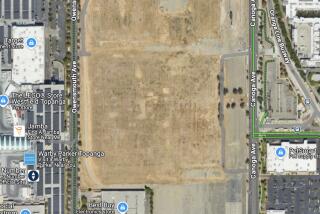Rocketdyne Cancels Contract With Soil Tester
SIMI VALLEY — Rocketdyne said Thursday it has decided to fire a soil testing contractor from work at the Santa Susana Field Laboratory because the company was accused by Los Angeles water officials two years ago of falsifying test records.
Rocketdyne spokesman Jerry Gaylord said his firm this week is ending the testing contract it had with Transglobal Environmental Geochemistry, or TEG, and searching for a new company to redo much of the work because of concern about public reaction to the allegations recounted in newspaper reports.
Gaylord also retracted earlier claims that Rocketdyne knew nothing of the suspicion surrounding TEG when it hired the firm two years ago to seek out toxic chemical spills at the huge research complex nestled in the mountains near Simi Valley.
At a contentious meeting Wednesday night, Gaylord told state and federal environmental officials and neighbors of the field lab that Rocketdyne first learned of the TEG allegations from a story in The Times.
The Times reported last week that in 1995, officials in the Los Angeles Regional Water Quality Control Board had accused one of TEG’s owners of fabricating instrument checks needed to verify the accuracy of test results at a Los Angeles site.
A memo by the water board employees recommended the board drop the firm from the agency’s list of approved labs. And a former TEG worker alleged in a 1995 lawsuit that TEG owner Blayne Hartman asked her to tamper with data so it would pass water board standards.
Hartman has denied those allegations. He admits he made “some mistakes,” but he also points out that TEG remains on the water board’s list of approved soil-vapor testing contractors.
But on Thursday, Gaylord said that while he personally did not hear of the allegations until last week, other Rocketdyne officials first learned of them two years ago.
“Rocketdyne did know there was some suspicion cast on this company,” Gaylord said. “But at that time, our people checked with both the water board and the DTSC [California Department of Toxic Substances Control], and said, ‘Is this a good company? Is this something we should be concerned about?’ ”
Gaylord said the state told Rocketdyne officials that TEG was still on the list of contractors approved by both agencies. “The response we got was, ‘No, they’re a good company.’ . . . We thought that issue had been resolved.”
The TEG contract-cancellation announcement came just a day after longtime Rocketdyne critics attacked the firm’s choice of soil-vapor testing companies. Gaylord wrote a letter Thursday to one of those critics, Joseph Lyou, the executive director of Committee to Bridge the Gap, an environmental watchdog group.
*
It said in part, “Rocketdyne originally understood this issue to be resolved. However, when these allegations were raised in the media, it was obvious that it had not been and could raise public concern. For that reason we felt it was necessary to stop all work by TEG.”
Rocketdyne suspended its contract last week and decided to end the contract this week.
Rocketdyne will search for another company to retest all the areas where TEG’s soil-vapor analysis found either no soil contamination or contamination levels too low to trigger government-mandated cleanup work. The tests measure the gaseous byproducts of toxic solvents that spilled into the ground during four decades of testing on rocket engines, atomic reactors and other high-tech research.
As for the areas where TEG found illegal levels of contamination, Gaylord said Rocketdyne would be conducting chemical tests on the soil itself to determine the severity of the spillage.
TEG’s Hartman said Thursday he is disappointed his company lost the contract, which, after more than 300 soil-vapor samples taken since November, was almost complete.
“The bottom line is, if people are not happy with our work, they shouldn’t use us,” said Hartman, whose 7-year-old company is based in Solana Beach in San Diego County.
“If my data do not satisfy the agencies, we don’t expect to get paid,” he said. “And I do hope you’ll write this: We have always, when our data are not accepted for any reason, had a full guarantee. We have always either gone back and redone it to be right, or we don’t expect to be paid.”
More to Read
Inside the business of entertainment
The Wide Shot brings you news, analysis and insights on everything from streaming wars to production — and what it all means for the future.
You may occasionally receive promotional content from the Los Angeles Times.










